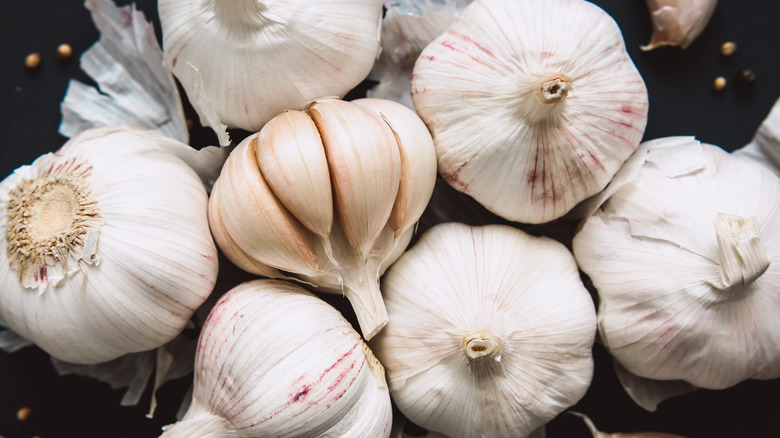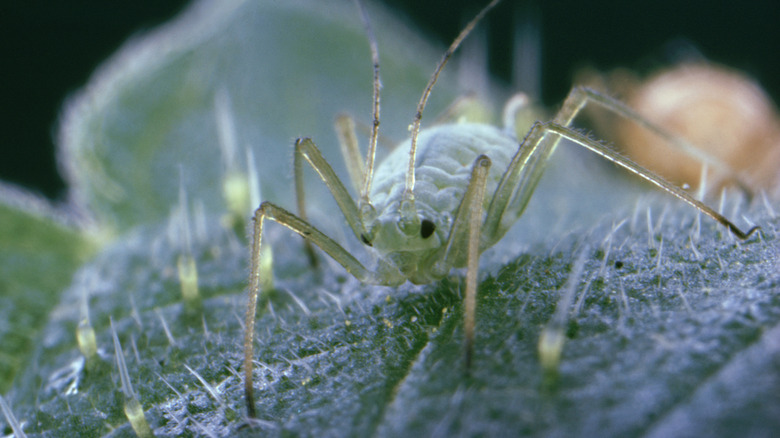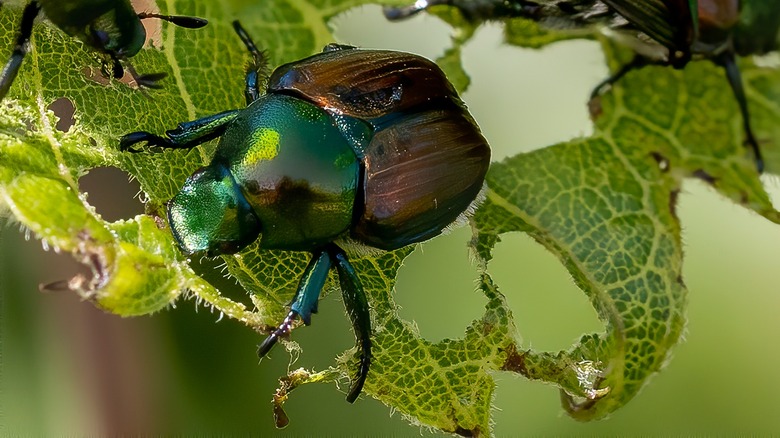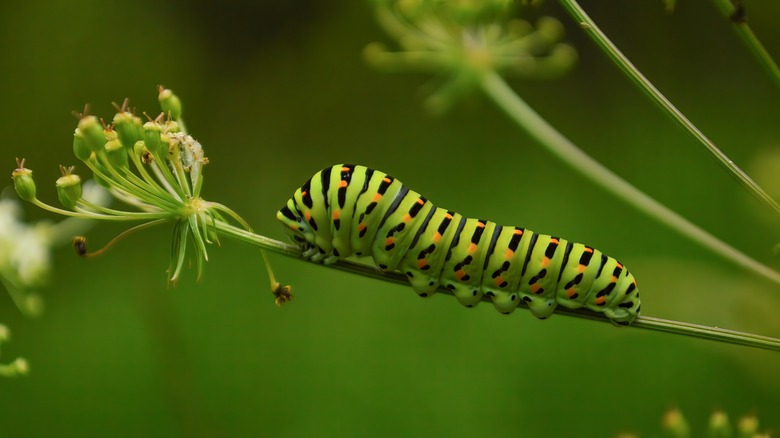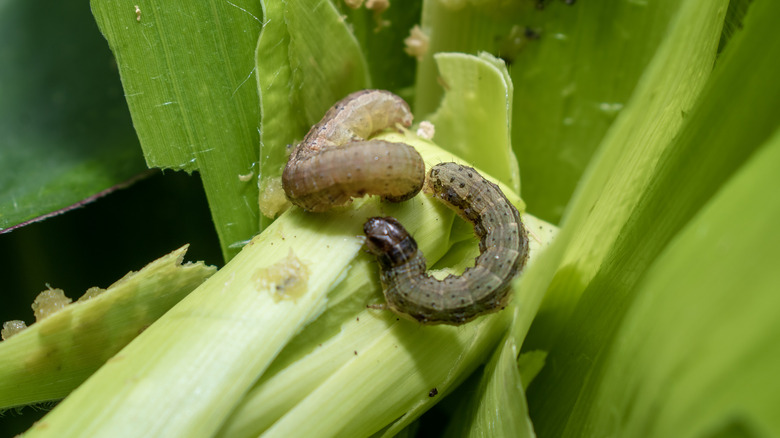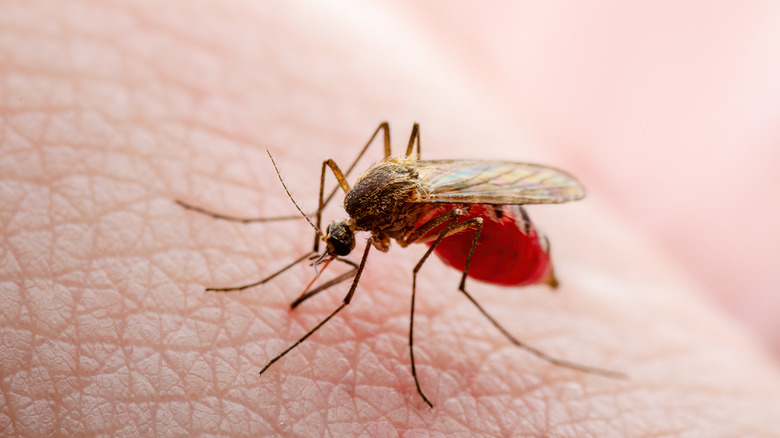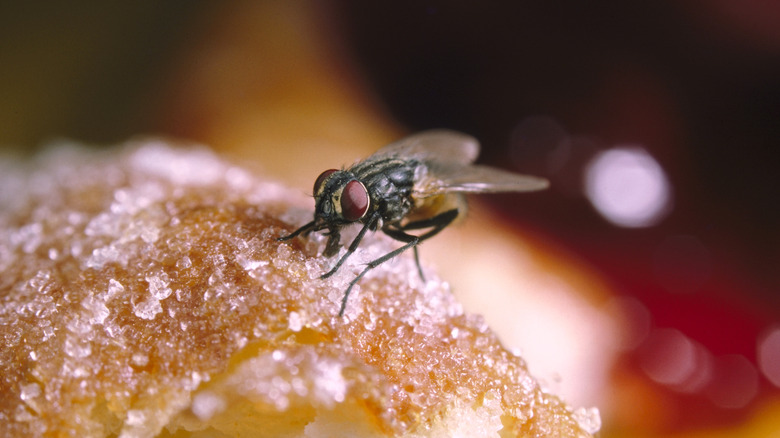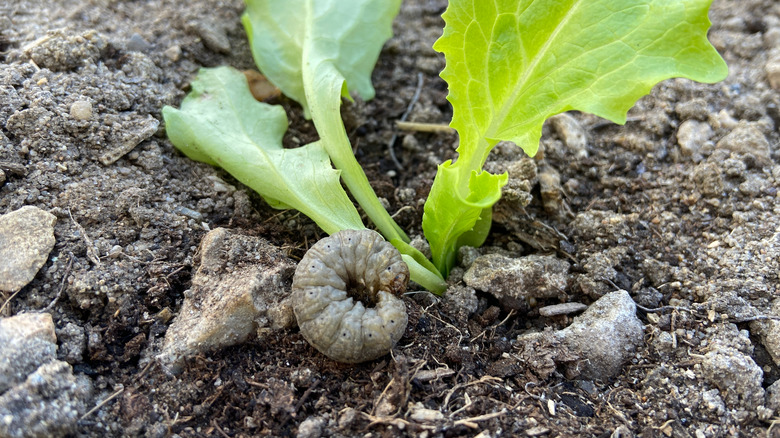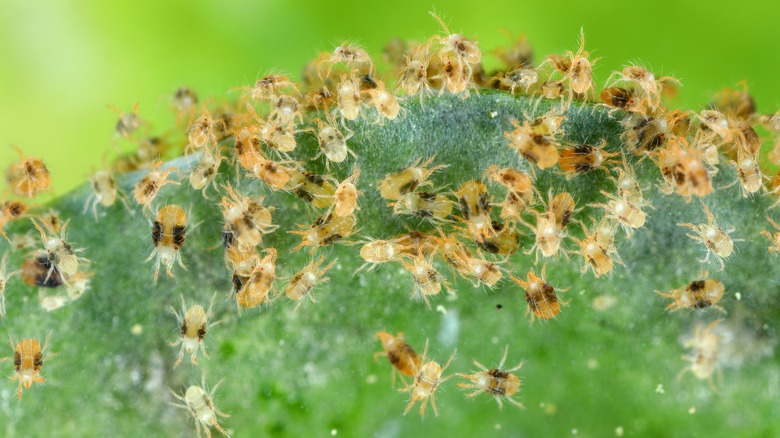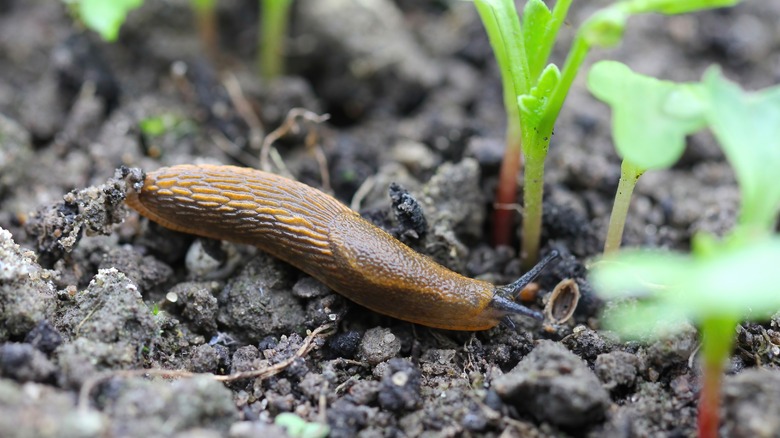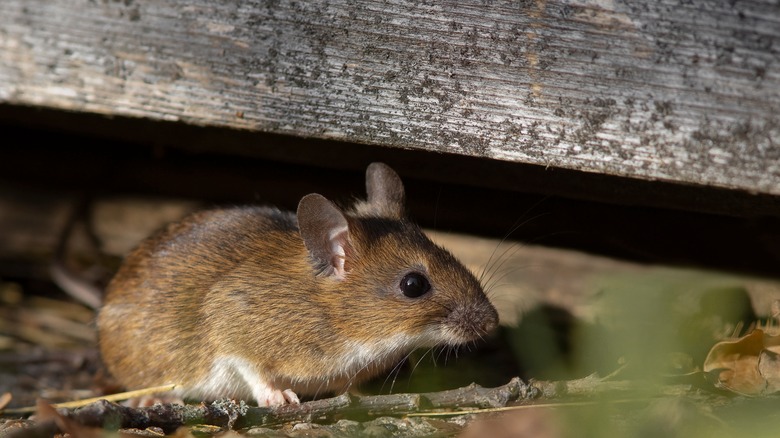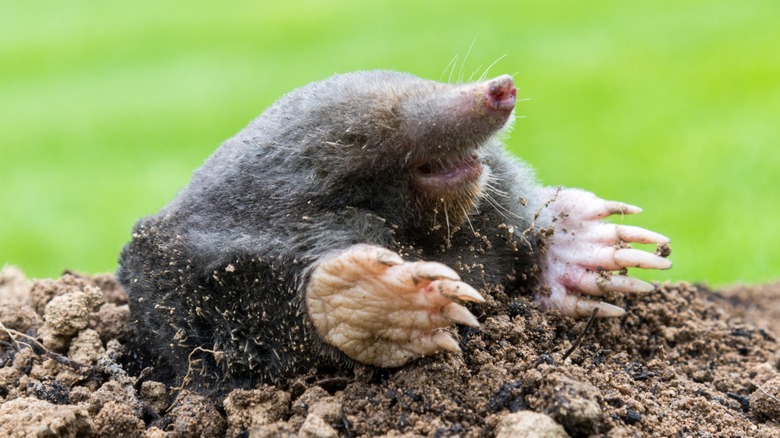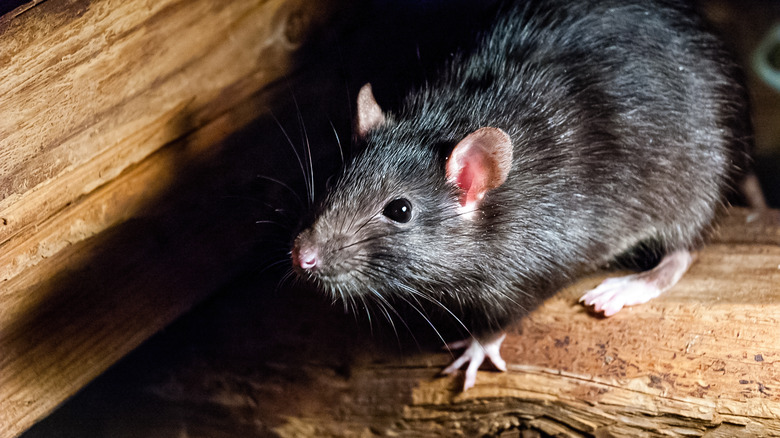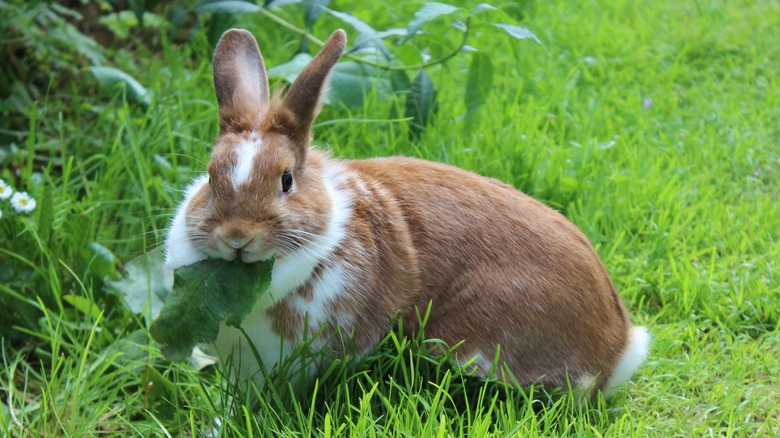Garlic In Your Garden Will Keep These Pests Far Away
Garlic is one of those things you people love or hate. There is no middle ground. While its flavor is essential for dishes in French and Italian cuisine, this pungent aromatic has a lot more going for it than as a flavoring for pasta sauce. Garlic has several health-related benefits and also serves as an excellent repellent. And we're not just talking about repelling bad dates or vampires. Garlic is actually an amazing crop to plant or use if you want to keep common garden pests away.
Garlic contains an assortment of natural compounds and oils that provide it with its pungent aroma and astringent taste. This scent and taste are something that a lot of pests cannot stand, which is why you need to consider using it as an all-natural pesticide before you consider something synthetic.
You can use garlic as a pest repellent in many different ways. We will go over processes such as interplanting and making a homemade spray using a few simple ingredients that we bet are already lying around your house. However you end up using it, garlic will do the job of repelling some of the most common and annoying garden pests around.
Aphids
Anyone who gardens is familiar with aphids. These small but rotund insects come in a variety of different colors and classifications. Feeding almost exclusively on plant sap, aphids will attack leaves, stems, and even the roots of plants in order to acquire food, though the damage is seldom fatal. And with how quickly they are able to reproduce, aphid introduction into your garden or orchard is going to provide you with quite the headache. Some favorites of the aphid include cabbage, potato, pepper, spinach, asparagus, dahlia, rose, and iris.
Since aphids commonly like to feed on the roots of plants, planting garlic in the ground near the affected plants is going to be the best solution. This is called interplanting, a process by which you grow two or more different plants in the same garden bed. The idea is to maximize yield and utilize every available inch of the garden.
When garlic is planted near the plants aphids love, such as lettuces or roses, the volatile compounds overwhelm the insects, causing them to flee. This is a common theme we will see throughout this piece. However, some pests, as we will see, react to garlic more severely than others. But planting it is probably the easiest and least smelly way you can protect your garden from aphids.
Japanese beetles
While there are beetles that can be beneficial to your garden, Japanese beetles are not one of them. An invasive species in North America, Japanese beetles are known to cause irreparable damage to over 300 varieties of plants, per the USDA. Even as grubs, these beetles destroy lawns and pastures, before moving onto vegetables, flowers, and fruit trees as adults. These beetles can be very difficult and potentially expensive to manage. Not, however, if you've got some garlic.
Japanese beetles are repelled by the strong sulfur scents of garlic. Like the aphids, the potency of garlic causes the beetles to turn wings and scuttle away. However, you're going to need to do more than just plant the garlic if you want to protect your garden from Japanese beetles. Instead, you are going to have to mix up your own all-natural liquid pesticide.
You can create a spray using garlic and spritz it over your plants. The general recipe is a ¼ pound of garlic to a quart of water. You blitz everything together in a food processor before sieving it through cheesecloth. Spraying it on your plants will make them smell garlicky, provided you only spray the leaves and stems, and not the fruit itself. This way it won't affect the plant's flavor in any way.
Caterpillars
Just as there are good and bad beetles in your garden, so too are there good and bad caterpillars. Though it is certainly nice to see their transformation into beautiful butterflies and moths, caterpillars can cause some significant damage to your garden in the process. As the old children's book suggests, caterpillars are, indeed, very hungry. If several caterpillars decide to make your garden their personal salad bar, you are going to see the effects. Damaged foliage, fruit, and vegetables with holes burrowed through them, and stems eaten to within an inch of their lives. There are plenty of chemical repellents you can use to rid yourself of caterpillars. Fortunately, you won't need to do that, because you've got garlic on your side.
Once again, like our friends the beetles and the aphids, caterpillars have an extremely strong sense of smell. It is what makes up for their relative lack of eyesight. So, when they come across the overwhelming sulfur scent of the garlic, they will hightail it back to wherever they came from.
This is a great opportunity to use your garlic spray on some of your more beloved plants. Interplanting won't do much to deter caterpillars, as the scent is not strong enough from the ground. The spray is much more effective. The caterpillars will have to become beautiful butterflies somewhere else.
Armyworms
If the name "armyworm" makes it sound as though these insects are prepared to invade your garden and take no prisoners, that is because they are. Armyworms are a specific type of caterpillar that deserves special mention because of the catastrophic damage they can do. Like an army plowing through enemy lines, armyworms can wreak havoc on lawns and gardens. As fully developed moths, they can lay upwards of 1,000 eggs in one night. Once the eggs have reached the larval stage, they will begin to consume foliage for food and cause lasting damage. They have a tremendous effect on grassland, as well as flower beds and vegetables.
Armyworms do not care for the scent of garlic. This is one of those occasions where using your garlic spray is going to come in handy. We wouldn't recommend spraying your entire lawn, lest you want to repel your neighbors as much as the armyworms. However, a good spritzing on the garden, especially on the foliage and stems, is going to prevent the armyworms from causing damage in that area.
If you want to get them out of your lawn, use a mixture of water and lemon-scented dish soap and pour some near the affected area of your grass. The armyworms will be forced out of their hiding places, at which point you can scoop them up and dispose of them. If you have chickens, armyworms make for a great snack.
Mosquitoes
We cannot think of a single person who likes mosquitoes. Though they don't cause much damage to plants, having them buzz around your garden is not only aggravating but potentially dangerous. Apart from making your body itch all over, mosquitoes can carry a whole host of diseases, including, but not limited to, West Nile Virus, Zika Virus, Malaria, La Crosse Encephalitis, Jamestown Canyon Virus, Eastern and Western Equine Encephalitis, and St. Louis Encephalitis. So, having a way of repelling them is only going to benefit you in the long run.
There is some debate surrounding whether or not garlic does actually work to repel mosquitoes. It's been said that by eating it, your body secretes enough sulfur compounds to ward off mosquitoes. However, this has proven to be inaccurate. You will need to spray the garlic in your garden or on yourself in order to ward off these pesky insects.
If you want to reduce the smell of garlic, other herbs like lemongrass, peppermint, bee balm, lavender, and rosemary have also been known to repel mosquitoes. So, you can come up with a mix of things that you like in order to keep these pests at bay. It's better than spraying yourself or your garden with toxic chemicals.
Flies
Another pest that doesn't present any particular physical damage to plants or livestock, flies are nevertheless one of the great nuisances of the insect world. They buzz around, land on food, and never seem to go away. They can lay eggs in just about anything but are particularly fond of the manure of farm animals, compost heaps, rotting vegetables, and meat that has been left out uncovered. Once their larvae take hold, the plants and meat are just about ruined. So, how can one prevent flies from hanging around your garden? You guessed it: garlic.
Flies do not like the smell of garlic one iota. In fact, they are so averse to its pungency, that you might be fooled into thinking vampires transform into flies as opposed to bats. They just hate the stuff. Sulfur, in general, is a great repellent for many pests, and because garlic has it in abundance, it is a prime foil for the winged vermin.
Garlic comes into particularly great use for anyone who keeps cows. A cow that eats garlic will sweat off the odor, which is released through their skin and manure, which will work wonders at keeping the flies away. You can use this with meat herds or dairy cows.
Cutworms
As their name suggests, cutworms chew through and cut the stems of the plants, stunting growth and even causing some to die prematurely. If you see their ugly, grayish presence in your garden, you are in trouble. Cutworms love to feast on some of the most commonly grown garden plants, such as potatoes, tomatoes, celery, carrots, peas, peppers, corn, and lettuce. And, though we've been telling you that a relatively minimal amount of garlic will do the trick on most pests, cutworms require something stronger.
There are two types of garlic that can be grown: hardneck and softneck. Hardneck is what you need in order to repel cutworms. This variety of garlic produces lager bulbs with far stronger, and far spicier flavor. They have a distinct, heavy flavor when cooked, and emit an extremely strong scent when crushed.
You can use any hardneck variety to make that garlic spray we have been talking about. When you've made it, apply it to the base stems of your plants, as well as the stems of the foliage. It should be enough to repel the cutworms or kill any that think it wise to munch on the sprayed stems.
Mites
An aggravating member of the tick family, mites are among the most annoying and potentially dangerous insects that can be found in your garden. Unlike their bloodsucking cousins, mites don't attach to your skin and gorge themselves on your tasty blood. They will feast, but only in the form of bites, which leave distinctive red welts on your skin. They are particularly dangerous owing to the fact that they can very easily pass along diseases to other people and animals.
Thankfully, they despise garlic. Because they do not dwell in the ground, interplanting your garlic is not going to be enough to repel the common types of garden mites, such as the common red spider mite. Therefore, you are going to need to use your garlic spray in order to keep them at bay.
Mites don't prefer one plant over the other, so it might be best in this instance to spray the plants along the border of your garden. It's almost like placing a shield around your plants, protecting you as you work inside the garden and creating an overall more stress-free environment. Mites can also attack the base of plants before working their way up to the foliage, so it'll be worthwhile to spray those areas, too.
Slugs/snails
Snails and slugs are a two-for-one package. Though, in some countries, their presence in a garden is met with excitement over the culinary uses they present, for the vast majority of gardeners, slugs and snails are unwelcome. Though they move slowly, if you don't take care of them with speed, they will destroy a garden faster than you can blink. They are particularly fond of strawberries, lettuce, and cabbages. There are several slug and snail mitigation methods. Everything from salt to ducks – who love to eat slugs and snails – and even pesticides have been used. But you don't need to buy waterfowl or chemicals to prevent snails and slugs from taking hold.
Garlic is an exceptional way of repelling slugs and snails from your yard. Here's the kicker, though. Garlic won't just turn slugs and snails away. It'll downright kill 'em. The allicin compound created by garlic kills slugs and snails who ingest it. Use your garlic spray for this, as it is most effective in terms of distributing garlic around your plants.
Slugs and snails thrive in moist, cool environments, meaning that they are most active in the evening and night. So, spray whatever plants you believe to be the most at risk just before nightfall. Whatever snails or slugs have been invading your garden in the evening will be quickly turned away, or killed.
Mice
If there is one critter that can make people shriek with fear more than any other, it is mice. These rodents do untold amounts of damage to gardens, homes, and anywhere else they might proliferate. They also spread disease and parasites. It doesn't help that they leave behind evidence of their invasion into your garden or pantry. Thankfully, all you need is a little garlic, and they will be warded off.
Rodents, by their very nature, have a highly attuned sense of smell. That is how they can suss out all of those tasty morsels you thought you had hidden away. In a garden, mice are particularly fond of corn, sunflower seeds, and other vegetation. Your garlic spray is going to be your best tool here.
Be sure to use stronger garlic, the same hardneck variety you will use to deal with the cutworms. The stronger the garlic scent, the less likely the mice are going to come after your prized vegetables. This really works best outside in the garden. Not so much indoors, as the garlic scent could cling to other things in your pantry.
Moles
Here's the thing about moles. Unlike the charming character from "The Wind in the Willows" real moles are far more destructive than their cute visage would have you believe. Almost completely blind and disliking sunlight, moles live the vast majority of their lives underground, burrowing around your garden and lawn. Therefore, most mole damage actually goes unseen, which is worrisome. They will feed on roots and root vegetables, ravishing your garden from within.
Because of their poor eyesight, moles have a highly attuned sense of smell. In fact, there are some moles that have star-shaped tendrils on the ends of their noses, which can pick up smells from a great distance. Though they use their noses to find their food, they will recoil at the smell of garlic. Again, the sulfur presents too much of an off-putting scent for them, meaning that they will steer clear of this pungent aromatic.
Interplanting is the key to success here. As moles will burrow through the garden, coming across garlic bulbs is going to send them in the opposite direction. So, plant your garlic near any plants that moles love to eat, such as marigolds, other cut flowers, and many vegetables.
Rats
Another unwelcome rodent that makes nearly everyone cry out in disgust is rats. No one wants to see these guys. Anywhere. Not in basements. Not in gardens. Not in sheds. Not in chicken coops. Nowhere do we want to see rats. They multiply far too quickly for anyone's liking and are known harbingers of pathogens. Plus, they will up and eat just about anything that is put in front of them. And your garden, which you worked so hard to grow, is one of those things.
Fortunately, for you, rats despise garlic for the same reason that other rodents do. It's the smell. Since garlic contains sulfur compounds, it is automatically an irritant to a rat's super-sensitive nasal passage. Plus, the allicin in the bulbs irritates the rodent's stomach if ingested. Garlic can actually harm the red blood cells of rats, causing anemia, which could lead to death.
Again, the garlic spray you've made using the strongest variety of garlic you can find is recommended here. Spray on the leaves and stems of your plants, as well as around the border of your garden, and anywhere you see evidence of them burrowing.
Rabbits
If you've seen the results of a rabbit infestation in your garden, you will very likely have more sympathy for Mr. McGregor than for Peter Rabbit. Rabbits are enormous pests to home gardens, eating absolutely everything they can lay their paws on. All of those vegetables you're working so hard to grow are like a candy store for wild rabbits. You need to get past their cuteness in order to successfully repel them. You also need to use garlic.
Rabbits hate the smell of garlic for more reasons than just its scent. They hate the smell of garlic because they know it will kill them if they eat it. The compounds contained in garlic, as well as other allium plants, can damage the red blood cells of rabbits. As we've seen with rats, this damage can lead to anemia, which is highly fatal.
Not that you want to be killing wild rabbits as a habit, but you at least want to keep them away from your garden. Most rabbits will just be put off by the scent of garlic and not venture any closer. If they should consume a garlic-sprayed leaf, however, they are not likely to make it out alive.
Deer
Finally, we have deer. Like rabbits, in spite of their cuteness, deer are an unwelcome sight in a garden or orchard. They love feasting on bushes, especially those which bear fruit. And, thanks to their abundant energy, they are likely to eat a lot of your plants and shrubs in one sitting. Thankfully, this last pest on our list is also not a fan of garlic.
Though it will not kill them like it will rabbits or rats, garlic is highly off-putting to deer because of its strong, astringent smell. So, you need only spray the garlic pesticide you made on your favorite plants and shrubs, and the deer are not likely to return any time soon. You could also crush some garlic cloves and mix them in with the mulch you've spread around your plants. That will also be enough to keep deer at bay.
So, you see, garlic has a lot more uses than just in cooking or preventing a good night kiss from a bad date. The little bulbs are extremely good at repelling pests, and offer an all-natural solution to their control in your garden. Hopefully, we've inspired you enough to give it a go in your garden come the season.
